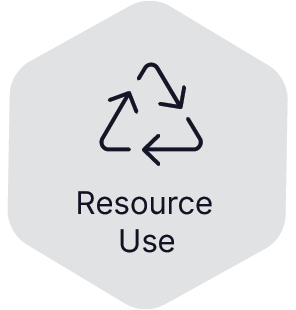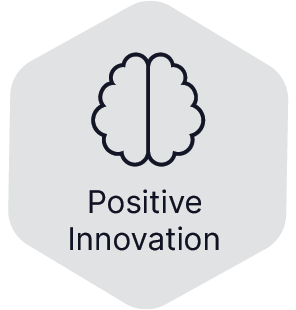ESG
Domains

It’s useful to think about ESG in terms of Domains and Metrics. There are 18 Domains under the E, the S and the G. Under each Domain, there are Metrics.
Common metrics have been endorsed by the Big Four consulting firms and the World Economic Forum. But you don’t need to worry about the Metrics for now.
The most important step is to work out the Domains that matter most to your business. Then the Metrics become clear.
We automate this whole process for you and you can get started now. But an overview of the 18 Domains is found below
- The Domains
E

Climate
How your business contributes to the causes of climate change
Man-made climate change, driven mainly through the build-up of greenhouse gases (GHGs) in the atmosphere, presents an existential threat to human civilization.
Learn more about how your company could be contributing to climate change and what metrics you can use.

Land
Companies can cause severe damage to land-based environments (such as forests and grasslands). This is especially relevant in ecologically sensitive environments.

Air
Air pollution is a leading cause of ill-health and premature death. For many businesses – particularly those with industrial processes – contribution to air pollution is common.

Water
Water is essential for the health of the environment, society and economy. Every company uses water, and some contribute pollution to water systems, like lakes, rivers and oceans.

Waste
Waste is just that: a waste. Resources are lost. Single-use plastics are a big part of the problem because they generally can’t be recycled and often aren’t biodegradable.

Resource Use
Resources are limited and demand for them is growing. Companies need to get smarter about how they are used, particularly in manufacturing, industrial, agricultural and construction applications.
S

Positive Innovation
Companies are under increasing pressure to create products and services that create positive environmental or social value. Innovation unlocks these needs.

Community Benefit
Strong communities are good for business. Particularly for companies stituated in – or close to – local communities, providing benefit to those communities is not just an expectation, it can be a strategic imperative.

Diversity & Inclusion
A diverse workforce is good for business. Gender and cultural diversity, particularly within executive teams, support better decisions and superior financial and non-financial performance.

Human Rights
Around 40 million people are in some form of modern slavery today – including children. Companies are expected to manage this and other human rights risks across their supply chain.


Fair Pay
Paying fairly helps eliminate inequality, discrimination, financial hardship and poverty. When companies fail to provide fair pay, they can widen gaps between different groups of people.

Skills and Training
Skill shortages are getting bigger as industries evolve. According to the World Economic Forum, more than half (54%) of all employees will require significant reskilling.
G

Leadership
Companies respond to this issue by implementing policies and procedures that ensure company leadership is selected, is governed, is trained with appropriate oversight.

Engagement
Companies respond to this issue by implementing processes to identify and engage with people and organisations that have a relevant interest in the company’s social and environmental performance.

Ethics
Companies respond to this issue by establishing policies, internal reporting mechanisms and dedicated oversight to ensure ethical corporate behaviour.



Environmental Domains consider how your company treats the planet.

Climate
How your business contributes to the causes of climate change
Man-made climate change, driven mainly through the build-up of greenhouse gases (GHGs) in the atmosphere, presents an existential threat to human civilization.
Changes in temperatures attributable to human activity have been occurring since industrialisation, though recently the impacts of those changes have intensified. The current atmospheric levels of GHG emissions are the highest they have ever been. Climate change “impacts” include effects on lives, livelihoods, health, ecosystems, economies, societies, cultures, services and infrastructure due to the interaction of climate changes or hazardous climate events and the vulnerability of an exposed society or system.

Land
How your business impacts land and natural environments
Companies can cause severe damage to land-based environments (such as forests and grasslands). This is especially relevant in ecologically sensitive environments.
Land use can have a significant impact on the physical environment and biodiveristy. Destruction of biodiversity and land-based ecosystems can lead lead to significant cost for communities and the broader environment.

Air
How your business impacts air quality
Air pollution is a leading cause of ill-health and premature death. For many businesses – particularly those with industrial processes – contribution to air pollution is common.
While closely related, this issue is different to carbon emissions (which contributes to climate change). Instead, it is mostly about the release of particulate matter (like dust) or chemicals (like sulphur) into the air. Any air pollution is important to consider, but it is particularly important when it impacts urban and densely populated areas.

Water
How your business impacts water quality and availability
Water is essential for the health of the environment, society and economy. Every company uses water, and some contribute pollution to water systems, like lakes, rivers and oceans.
Water use and consumption can be particularly sensitive in water-stressed areas and in times of drought. So too, the impact of water pollution (including excess nutrients, heavy metals and other toxins) is important to consider, particularly for companies that generate any kind of liquid waste, runoff or effluent in their own operations or through their suppliers and distributers.

Waste
How your business manages waste
Waste is just that: a waste. Resources are lost. Single-use plastics are a big part of the problem because they generally can’t be recycled and often aren’t biodegradable.
Solid waste that is most problematic includes single-use plastics and any other non-recyclable solid waste items, like polystyrene or styrofoam. Solid recyclable waste can also become a problem for companies operating in places with no practical access to functional recycling options.

Resource Use
How your business uses and recycles resources
Resources are limited and demand for them is growing. Companies need to get smarter about how they are used, particularly in manufacturing, industrial, agricultural and construction applications.
Given the growing demand on the world’s resources, companies will need to find better ways to reduce, re-use and recycle more and more.


Positive Innovation
How your business develops products and services that have positive impact
Companies are under increasing pressure to create products and services that create positive environmental or social value. Innovation unlocks these needs.
Innovation is a critical success factor for companies and can make the difference between long term survival or failure. Innovation also plays an important role in driving improvements on a range of social and environmental challenges. Through the development of new products and services, companies have the opportunity to address a range of sustainability challenges.

Community Benefit
How your business creates value for the communities in which it operates
Strong communities are good for business. Particularly for companies stituated in – or close to – local communities, providing benefit to those communities is not just an expectation, it can be a strategic imperative.
Companies can contribute positively to the vitality of the communities in which they operate, and people in general. Companies can make these contributions through their operations, product and services, and what they invest directly into community initiatives. Strong communities strengthen workforce talent pools, enlarge the customer base and its buying power and enhance supplier relationships and partnerships.

Diversity & Inclusion
How your business employs people from different backgrounds, identity and experience
A diverse workforce is good for business. Gender and cultural diversity, particularly within executive teams, support better decisions and superior financial and non-financial performance.
Diversity and Inclusion is about employing, supporting and promoting people of different age, sex, race, ethnicity, ability, origin or any other status. While who you employ is an important part of this issue, it is just as inmportant to consider how people from diverse groups are enabled to succeed within your organisation.

Human Rights
How your business manages human rights risks across its operations and supply chain
Around 40 million people are in some form of modern slavery today – including children. Companies are expected to manage this and other human rights risks across their supply chain.
Child labour and forced and compulsory labour are fundamental voilations of human rights. Governments are introducing new regulation to tackle the issues including requirements for risk assessments and mandatory disclosures.

Health and Safety
How your business looks after the health, safety and wellbeing of employees
Companies are responsible for the health and safety of their workforces. Maintaining strong standards of health, safety and wellbeing can improve employee productivity too.
This issue is about the health, safety, and mental, physical and social well-being of all people in a company’s operations and value chains. Some industries, such as mining or chemicals, face a higher inherent risk to physical health and safety than other industries such as financial services, where mental health may be a greater concern.

Fair Pay
How your business rewards employees
Paying fairly helps eliminate inequality, discrimination, financial hardship and poverty. When companies fail to provide fair pay, they can widen gaps between different groups of people.
Fair pay is about ensuring that remuneration practices reward equal work with equal pay. It is about providing sufficient payment for employees to sustain their livelihood. Fair pay ensures that no employee receives less reward based on who they are or what they believe. This issue is important for every company with employees, particularly those that employ people in poor or disadvantaged communities.

Skills and Training
How your business trains and provides opportunity to employees
Skill shortages are getting bigger as industries evolve. According to the World Economic Forum, more than half (54%) of all employees will require significant reskilling.
Changes in global markets and business models have led to an increase in skills gaps. Failure to invest in training, education, skilling and re-skilling of employees can affect business performance, including higher operating costs and effects on reputation and talent retention.

Governance Domains consider how your company is being run.

Leadership
How your business’s leadership operates, is selected and remunerated
Companies respond to this issue by implementing policies and procedures that ensure company leadership is selected, is governed, is trained with appropriate oversight.
The way a company operates is often a reflection of how a company is led. Effective leadership requires having a Board that understand’s a company’s responsibility towards people and the environment, clear governance and reporting processes, remuneration and incentives that drive positive social and environmental performance, and a clear purpose and direction for the company to follow.

Engagement
How your business manages relationships with people and partners
Companies respond to this issue by implementing processes to identify and engage with people and organisations that have a relevant interest in the company’s social and environmental performance.
Engagement is about having the processes in place to understand stakeholders’ concerns and the company’s impact on them. Effective engagement should ensure a robust process for identifying and selecting relevant stakeholders (e.g. employees, customers, suppliers, local communities and shareholders) and for proactively soliciting their input, while outlining the frequency and method of engagement.

Ethics
How your business ensures ethical behaviour and decision-making
Companies respond to this issue by establishing policies, internal reporting mechanisms and dedicated oversight to ensure ethical corporate behaviour
A principle for good governance is the effective oversight of corporate decision-making to ensure compliance with relevant laws and regulations, as well as meeting stakeholder expectations for ethical behaviour. Stakeholders’ increasing interest in societal impact and greater demand for transparency are encouraging firms to go beyond simply “playing by the rules”, including by demonstrating how their behaviour is consistent with the firm’s broader purpose. A big part of this is establishing and supporting culture, policy and an operating environment that foster ethical behaviour are critical components of good governance and long-term value creation. Consistent monitoring is important to ensure accountability for ethical behaviour. Particular attention should be paid to issues that may compromise the firm’s ability to operate in a trustworthy way with stakeholders, including shareholders.

Risk
How your business manages the risks associated with its impact on people and the environment
Companies respond to this issue by establishing a process to continually monitor, assess and respond to social and environmental risks and opportunities
Risk management is a critical aspect of good governance which requires regular and disciplined oversight. Opportunities need to be managed well too. Company leadership must constantly monitor and assess risks and opportunities associated with economic, environmental and social topics.

Transparency
How your business discloses its social, environmental and economic impact
Companies respond to this issue by tracking, monitoring and reporting data on its social, environmental and economic impact
Many companies publicly disclose and report data about their contribution (positive and negative) to social and environmental issues. This follows a general principle that responsible companies can be transparent about their activity because they have nothing to hide. Investors insist on these disclosures, requiring information from companies to better understand their ESG profile and evaluate finacial performance. Customers are also requesting information from companies about ESG performance in tenders and procurement processes.



















